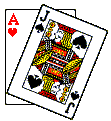



|
|
Blackjack Tidbits & Trivia
Did you know...
| ...if you could have a total of 18 every hand, and the dealer played normally, you would lose all your money in the long run? The dealer's average hand is a little better than 18. That's why Basic Strategy calls for you to hit a little more than newcomers might think. |
Did you know...
| ...when you double down, you
actually lose more often than if you just hit in such a
situation? However, the fact we have doubled the amount
of money in play is what makes it worthwhile! For example, suppose I can win 75 hands out of 100 at $10 each. This gives me a net of $500... the $750 I won less the $250 I lost. And yet suppose I can win only 65 hands out of 100 but this time at $20 each. This gives me a net of $600! ... the $1300 I won less the $700 I lost. In the second example, we won 10 less hands, yet won $100 dollars more! |
Did you know...
| ...the position immediately to the dealer's left is called "first base" and the position immediately to the dealer's right is called "third base?" Oddly enough, there are no other baseball terms whatsoever associated with the game. |
I'd like to thank L. Stephen Kelly for the remaining contributions.
You Be The Judge -- Who Was
The Dummy? You have three people that make the following plays:
The question is this: Who made the smallest error? |
Eighteen Is Even Worse Than They Imply!
|
But At The Same Time, Eighteen Is A WINNING Hand???
I played stupid and argued that 18 was a good hand. As he tried to convince me I said, "Tell ya what, let's play blackjack under these conditions":
He
answered me the next day (presumably he went home to
confirm the same statistic you read) saying he'd do
it. The play went like this:
My overall advantage was 1.5% with Basic Strategy, plus whatever I could add to it with counting (doubling on A-7 vs. 2 becomes profitable with slightly ten-rich shoes, as does splitting 9-9 vs. 7 and A; also, NOT doubling vs. 3 and 4 in sufficiently lean shoes saves a few bucks when the play is NOT correct), which I guessed was somewhere in the neighborhood of 2%. He cried uncle when he was $70 in the hole, now fully aware of the mistake he made. Yes, eighteen is a winning hand after all! :-)
|
But Aren't They The Same? In a single deck game, if you hold 10-9 vs. a 10-up, you hold a winning hand. But if you hold an A-8 vs. a 10-up, you hold a losing hand. Note in both cases, the hand you hold is 19, but in one form it wins more often than it loses, and in the other, it loses more than it wins.
|
Them Brits Do What?
That doubling A-8 vs. 6 is incorrect in a multideck game is beside the point. It is possible to double on A-8 if you are counting cards. However, with the above rule, card counter or not, one should think twice about doubling on Ace-8 in an English casino at all. Note: This rule of A + 8 + 2 = 11 when done as a double down rule also exists in most European casinos that offer doubling only on 9, 10, and 11. (Source: tons of them that mention European No-Hole rules.) |
How Much Did I Lose?
About the time our Hero the American Tourist was deciding how wonderful it is to get even with these Brits for that rotten trick they played on his soft A-8-2 (he has three hands of 21, after all), the dealer draws an Ace to his ten-up, announces blackjack, and picks up ALL of our American Tourist's wagers. The player notes it's correct only to lose the initial wager on splits and doubles vs. blackjack. The dealer points out that's an American blackjack rule, and he's not currently playing blackjack in America. Because you risk losing ALL wagers to blackjack in Europe (and in some Caribbean islands), including double downs and splits, you must modify basic strategy in the following manner:
In general, because of these restrictive rules, when in Europe, spend your time and money enjoying their scenery and culture, but save your blackjack for when you get home. (Source - same as above.) |